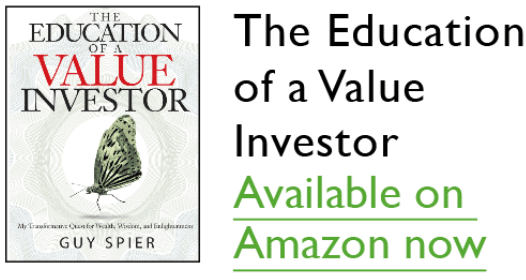So You Want to Be an Activist
By James Altucher
RealMoney.com Contributor
6/1/2005 4:16 PM EDT
http://www.thestreet.com/p/rmoney/jamesaltucher/10226105.html
Market Commentary
Many investors aspire to activism, using their heft to help out the little guy.
The 13-D is a remarkably effective tool, used well by Dan Loeb and Robert Chapman.
The management team at Expeditors International also uses filings to its advantage.
Everyone wants to be an activist. Everyone likes the idea of standing up for the little guy, the retail shareholder, the mom-and-pop that bought 100 shares of some dirt company and is now being exploited and pillaged by a greedy management team. The activists come in, stir up trouble, take money from the bad guys and give it back to the mom-and-pops. In general, this doesn’t work. And most activism degenerates resort to whiny arguments with lots of exclamation points in Yahoo! message boards being paroled by interns at the Securities and Exchange Commission.
I was reminded of the lure of activism during a meeting with a long/short hedge fund in Los Angeles. As usual, when I find myself visiting managers, I noted to myself that he had a great life, probably a better life than me. He had a great view of L.A., and he pointed out his $30 million house in the hills. But he was dissatisfied.
“I hate just picking stocks,” he said, “and staring at a quote screen all day.” He had a decent track record — up an average of 13% a year over the past eight years. He was also near what he felt was capacity for his strategy, about $100 miillion. “I want to get involved,” he said, “so we’re going to slightly modify our strategy and become activists.”
Well, based on my experience, if you want to be a successful activist, you should manage a midsize fund and be able to write a brilliant 13-D filing. Because for the good activist funds (I’m leaving out Carl Icahn) when the going gets good, the 13-D filings get going.
When an investor gets a large enough position in a stock (more than 5%), he can file with the SEC a public 13-D filing revealing his stake and his intentions. These intentions are normally expressed without much fuss (“We intend to be passive investors”) or they can stir the pot and begin a level of activism unpleasant to the management of the company. When it comes to writing activist letters, nobody is better than Robert Chapman of Chap-Cap Partners and Dan Loeb of Third Point LLC. I like reading these letters for several reasons.
Both Chap-Cap and Third Point have enviable track records, and I like to glean the insights of great investors. Their 13-D filings usually contain brutally honest assessments of the results of their due diligence, both the positives and negatives: what they like about the companies (after all, they bought up more than 5% of the company) and what they didn’t like (hence the reason for their activism). Learning the extent of their due diligence is always a fruitful lesson.
When a CEO is accused of all the things these two activists accuse their respective CEOs of, it would normally seem like a red flag. Oh, a CEO is paying off all his friends through advisory fees — don’t invest. And yet, these guys not only invest, they back up the truck.
This is true investing: While everyone else is seeing red flags and running in the other direction, these guys separate out the true value from the chaff that can be replaced (the management team, in these cases), take their positions and then attempt to do something about it. If a company simply has great management, great earnings and always good news, then either it’s a scam or everyone is already in the stock, leaving little room for upside. These guys go where the fires are blowing and attempt to put them out.
These letters are a step-by-step guide on how to turn a company around. It’s refreshing to read these thoughts and not the bland cheerleading that usually accompanies SEC filings. Whenever a retail investor can get hold of a snippet of honesty in a public document, it’s well worth the read.
Here are some of my favorites:
In December 2002, Robert Chapman accumulated a 7% position in Misonix (MSON:Nasdaq) , a maker of ultrasonic medical devices. The stock had fallen from a high near $10 to below $4 when Chapman decided to take issue and get involved. This 13-D filing in turn was followed by another 13-D filing on May 6, 2003.
The CEO remained but the company cut costs and reported better revenue and earnings, and the stock recovered accordingly.
So this activist effort brought the stock from $3 to a high of $12.34 in April 2004 before shares settled down to the current level in the $6s.
Third Point’s Pointed Arguments
Third Points’ Loeb doesn’t shy away from a battle. He most recently hit the newswires when an email correspondence between him and a prospective employee from Europe became public. Among his lines were:
We are an aggressive, performance-oriented fund looking for bloodthirsty competitive individuals, who show initiative and drive, to make outstanding investments.
This is why I have built Third Point into a $3 billion (1.6 billion euros) fund with average net returns of 30% over 10 years. We find most Brits are a bit set in their ways and prefer to knock back a pint at the pub and go shooting on weekends rather than work hard. Lifestyle choices are important, and knowing one’s limitations with respect to dealing in a competitive environment is too. That is Lesson One at my shop. It is good that we learned about this incompatibility early in the process, and I wish you all the best in your career in traditional fund management.
In early 2005, Loeb became an activist in Star Gas (SGU:NYSE) , an oil and gas utility. In the letter detailing his correspondence with the CEO, Loeb documents his concerns with the company and how he felt shareholder value could be unlocked.
Most investors, I think, would shy away from a company with the red flags cited in his letter, but Loeb clearly feels that the sins of the father should not be borne upon the child, or in this case, the company, which has legitimate oil and gas assets. Three weeks after Star Gas received this letter, CEO Irik Sevin resigned his post. Two months after that, the CFO resigned. At its next quarterly report, in May 2005, the company beat all expectations on revenue and earnings, and the stock soared upward.
My favorite part of this letter follows:
Sadly, your ineptitude is not limited to your failure to communicate with bond and unit holders. A review of your record reveals years of value destruction and strategic blunders which have led us to dub you one of the most dangerous and incompetent executives in America. (I was amused to learn, in the course of our investigation, that at Cornell University there is an “Irik Sevin Scholarship.” One can only pity the poor student who suffers the indignity of attaching your name to his academic record.)
Although I’ve been singling out the activists as the primary authors of such refreshingly honest letters, it’s even better when the brutal honesty comes from the management teams of the companies instead of the guys just trying to tear them down.
Expeditors International (EXPD:Nasdaq) has had very consistent results, both in earnings and stock price, and basically the management team could care less about analysts and pundits who want to take them down. They stay focused on their jobs and don’t take guff in their regulatory filings, and the results show this, as the stock just keeps climbing higher.
In some of their 8-Ks they answer questions from shareholders. For instance, in a July 2003 8-K, Expeditors’ executives responded to analyst Edward Wolfe of Bear Stearns, who has a sell rating on Expeditors’ stock.
“Let’s start with the fact that for a couple of months we have been ignoring your calls and emails. This is true. Your calls and emails requesting a visit have been ignored. The message is one that any seventeen-year-old boy would understand; you are not going to get your date. We were hoping not to have to give reasons, but we certainly wanted you to get the message: no date.”
And that, in a nutshell, is why its stock keeps going up.
To get the latest 13-D filings, you can go to sec.gov and search on latest filings, or go to edgar-online.com and search on filings from your favorite activist. Look for honesty, and watch for blood spilling. Those are the best buys.




